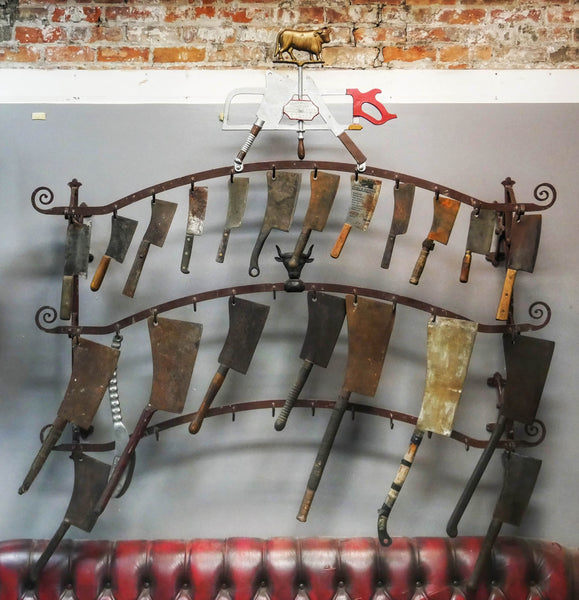As with most great historical tales about meat, this story begins in Germany… more specifically the village Hausen im Wiesental in Baden-Württemberg, Germany where Bernhard Gloekler was born on August 27, 1839. Bernhard immigrated to the United States with his parents when he was 14 years old and worked for James Brown and Sons gunsmiths for some time. In 1874 he began working as the successor to John Wagner, a butcher tool supply company on the receipt at the beginning of this post.
Gloekler's Secret Weapon
Bernhard (Bernard) Gloekler's company was literally in the nuts and bolts of the meat refrigeration business, designing and manufacturing latches, locks, and hinges to refrigerators for all kinds of end users, including florists and bakers. It's his son, Charles (born 1864, Pittsburgh) who created several patents on a variety of cast iron fixtures that sent the company in a much different direction. For this post we'll just concentrate on meat hanging racks.
Know your cuts
Meat racks up to that time were fastened to the wall and anchored from the other side. Charles’ innovation came in 2 parts - First was moving the meat away from the wall so it could hang more freely and not accessible to insects and pests; Second was to create different mounting brackets for different butcher shop needs. For example, Charles' 1890 patent is for a meat rack hanging from the ceiling allowed butchers to utilize what was normally wasted space while allowing the customer to see all sides of the cut easily

A good rack needs a great table
Beauty Meats Function
Charles Gloekler’s 1887 hanging meat rack featuring ornate additions to the wall-mounted brackets to help distribute/cushion the weight of a full rack. He improved on that in 1889 with a more ornate meat rack and a new wall bracket shape, but still utilizing the same concept. The result was quite dramatic while being functional.

We can sell your antique butcher tools and advertising
Hanging Around the Shop
The above picture shows that sometime between 1889 and the 1920s, a version of Patent 19,179 was created without a center support bar... the same version that happens to be hanging in our shop.
This meat rack was manufactured by Farwell, Ozun, Kirk, and Company out of Saint Paul, Minnesota, as noted by the plaque at the top in the center of the three decorative cast iron cutting tools used by butchers. Check out this rack in our shop to see additional pics.
Read how Chicago's Bromann Bros handled their meat








I recently acquired the 1887 Gloekler hanging meat rack. It has all 3 hook rails, one horizontal upper hook rail with the double-scroll ornamental design and 2 horizontal solid steel rails (thicker than the top hook rail) that fit into the 2nd and 3rd slots down the side rails. The slots for the decorative upper hook rail is smaller and not made quite so beefy! Would they have all originally had hooks on all three horizontal rails and maybe these are replacements (even though the slots are bigger and fit perfectly). The middle plaque on the decorative upper hook rail also says Glockler, with the Pat Date and under that has the name of Koehl… St. Paul, MN. I acquired it from the 55 year old grandson that said it was in his Grandpa’s Butcher Shop.
I have , what i believe is a food warmer from this company . We have had it on our farm since I can remember .
I have a platform scale from this butcher’s shop! It’s a Fairbanks scale with shop name and address clearly visible.
Leave a comment